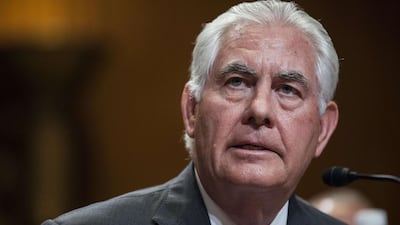Abu Dhabi // The US secretary of state Rex Tillerson has cancelled his trip to Mexico on Monday to remain in Washington and continue mediation efforts aimed at resolving the GCC crisis, confirming reports that he is spearheading Washington’s involvement in the dispute between key allies.
Mr Tillerson “will continue his efforts to de-escalate tensions in the Middle East region through in-person meetings and phone conversations with Gulf and regional leaders,” the state department said, adding he has “made more than a dozen phone calls and participated in several in-person meetings”.
Saudi Arabia, the UAE, Bahrain and Egypt cut diplomatic ties and transport links to Qatar on June 5, accusing Doha of providing support for extremist ideology and terrorism. Doha denies the accusation that it backs terrorist groups.
While US president Donald Trump has backed the Saudi and UAE position on Qatar, Mr Tillerson has been deputed to lead negotiation efforts by Washington, the most important ally of each of the three Gulf countries. He met with Qatari, Saudi and Emirati counterparts over the course of last week.
Mr Tillerson and the US defence department have called on both sides to end the crisis pitting key US partners against each other. Mr Tillerson has said that Qatar had made progress in cutting off funding for extremists by private citizens, but it must address its neighbours’ concerns more quickly.
The Saudi foreign minister has said a list of specific steps Qatar must take to end the GCC crisis would be announced soon.
“We are working on those with our Bahraini, Emirati and Egyptian partners in order to compile this list and present it to the Qataris, and I think it will be done fairly soon,” Adel Al Jubeir said after talks with his British counterpart in London on Friday.
There were limited details of his talks with Boris Johnson, but London is also an ally of Qatar, which is the single largest source of natural gas imports into the UK.
Qatari officials say they have not received clear demands, and will refuse to take any steps that breach national sovereignty.
Officials from the countries that cut links with Doha have said it must change its behaviour in three areas: support for groups they view as extremist, meddling in the internal affairs of fellow GCC states, and the use of Qatar-backed media to criticise neighbours and provide a platform for Islamists.
Bahrain TV on Friday broadcast recordings of phone calls between a top Qatari official and a Bahraini politician in March 2011, during an outbreak of protests in Bahrain.
The conversations between by Hamad bin Khalifa Al Attiya, an adviser to the Qatari emir, and Hassan Sultan, a member of the now dissolved Al Wefaq political group, showed that they were “conspiring to spread chaos across the kingdom”, the Bahrain News Agency said.
The Qatari foreign ministry, after initially denying the calls had taken place, later issued a statement questioning “why were these calls not exposed earlier, in 2011”.
The ministry suggested the recordings had been edited and said their release during the current crisis “is unequivocal evidence Qatar is being targeted”.
Mr Al Jubeir on Friday also reiterated that the economic and travel boycott of Qatar, and the requirement of its citizens to leave the three GCC countries, was only aimed at coercing change in policies.
“We consider Qatar an ally in the Gulf Cooperation Council, GCC, countries and we do not seek to harm Qatari citizens,” he said.
The BBC’s Frank Gardner said that a UAE official on Friday told journalists in a briefing in London that the crisis is not about Doha’s relationship with Iran, but about its support for extremism.
Riyadh, and Abu Dhabi in particular, have long been angered by Doha’s insistence on charting a maverick foreign policy based on leveraging the gains made by Islamist parties and militias after the Arab Spring to spread its own influence. As those groups failed to take hold of power, Shiekh Tamim bin Hamad Al Thani agreed to address similar concerns that led to diplomatic crisis in 2014. But those promises, Saudi and UAE officials say, have not been kept.
During talks on the crisis with Russia’s foreign minister in Moscow on Friday, Sultan Al Jaber, the Minister of State, said, “We have an opportunity to change Qatar’s behaviour and its support for extremism and terrorism. We are confident that the best solution is political and diplomatic, on the condition that Qatar would abide by the outcome of the 2013 Riyadh Agreement and its mechanism of implementation as well as the supplementary agreement of 2014.”
With Mr Trump on their side, Saudi and the UAE have pressed Washington to back their efforts to pressure Doha, and have suggested that more measures could be applied soon. The UAE ambassador to Washington said last week that the US should consider moving its base from Qatar, as it is Doha’s main “insurance policy”.
Qatari officials hope that Washington’s mediation role will help its negotiating position, and so far they have not indicated any concessions to be forthcoming.
Despite Mr Tillerson’s efforts, there have been no breakthroughs, and reports of summit hosted by him or the White House has not materialised. “As far as we know, there is no summit taking place at this time,” state department spokeswoman Heather Nauert said on Friday.
Qatar’s closest ally, Turkey, has called on Saudi King Salman to help end the crisis, and on Saturday Turkish foreign minister Mevlut Cavusoglu left Mecca after meeting with the king on Friday. Mr Cavusoglu met with the emir of Kuwait on Thursday, who is leading GCC mediation efforts.
foreign.desk@thenational.ae

